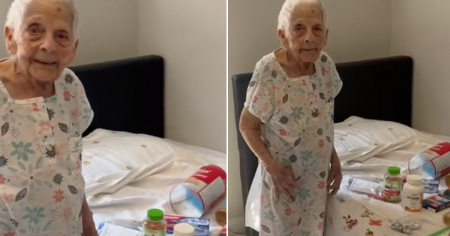A Cuban living in Nebraska has shared a reflection on TikTok about everyday products that were considered a luxury in his home country. In his video titled "Things of the Rich", content creator @soy_edgy compared the ease with which residents in the U.S. access certain items, while in Cuba these are practically unattainable for the majority.
In the video, which at the time of this note had over 12,000 views, @soy_edgy mentions products like Victoria's Secret perfumes, Pringles, ham and cheese sandwiches, undiluted detergent, bottled water, clothing from popular brands, and Apple devices. According to their testimony, when they lived in Cuba, obtaining some of these items was unthinkable or involved a tremendous financial sacrifice.
"When I lived in Cuba, having one of these cologne bottles was too expensive; it was literally a symbol of nobility, money, and wealth," she stated, referencing Victoria’s Secret perfumes, highlighting that in the U.S. they can be bought in discount stores like Ross at affordable prices.
Regarding Pringles, she stated that "if in Cuba you see someone with one of these chips, my dear, that person has money," while in the United States "hardly anyone buys them because, in addition to being super unhealthy, they’re irrelevant." She also recalled that in her childhood, if a child brought a ham and cheese sandwich to school, they were considered someone with means: "If you had ham and cheese at home just to make things, you had money."
The influencer noted that he still maintains money-saving habits learned in Cuba, such as diluting detergent with water to make it last longer. He also emphasized that on the island, "nobody buys bottled water in their daily life"; instead, they boil it or add bleach to purify it. Regarding access to hot water in the shower, he recalled, "That is the definition of having money in Cuba. I spent 23 years heating water on the stove and bathing with a bucket and a little jug."
Regarding clothing, he compared owning Zara, H&M, or Bershka pieces in Cuba to having a wardrobe full of Louis Vuitton items in the U.S. He also talked about Apple devices, noting that "having this year's iPhone in Cuba is a sign of wealth," and even more so if you own AirPods or an Apple Watch. "If it's updated, it means you're a millionaire, you must be Fidel's kid, who knows where you came from," he joked, emphasizing that in the U.S. these devices are often purchased on installment plans and are not seen as symbols of wealth.
The video has sparked a wave of reactions and comments from other Cubans and Latin Americans who identified with his testimony. @soy_edgy responded to some, admitting that he too could not afford certain products in Cuba and that, despite living in the U.S., he still maintains frugal habits. "I still have things from there," he commented.
The content from @soy_edgy is part of a trend on social media where Cubans who have emigrated share their experiences regarding the differences in quality of life between the island and other countries. Lietty Piña, who in Mexico highlighted how basic products such as toilet paper, Coca-Cola, meat, and clothing are scarce goods in Cuba. The YouTuber Anita Mateu has also spoken about "normal things" in Spain that were considered luxuries on the island, such as electrical stability or food availability.
Another case is that of the youtuber Michel Crónicas, who went viral in Mexico by describing himself as "a millionaire Cuban" for having access to drinking water, bread, and stable electricity, something that remains out of reach for many on the island. "The most important thing I have in Mexico is my freedom, and I know that if I work hard, I can achieve each of my goals," he stated in his video.
These types of publications continue to spark debates about the Cuban reality and the contrast between life inside and outside the island. While the mentioned products are part of everyday life for many abroad, for Cubans still residing in their country, they remain luxury items. The experiences shared on social media not only serve to connect the diaspora but also to highlight the precariousness on the island and raise awareness about the reality of those who still live there.
Frequently Asked Questions about the Differences in Quality of Life Between Cuba and the United States
What are some of the products considered a luxury in Cuba?
Products such as Victoria’s Secret perfumes, Pringles chips, ham and cheese sandwiches, undiluted detergent, bottled water, clothing from popular brands, and Apple devices are considered luxuries in Cuba. These items are difficult to obtain due to their high cost and limited availability on the island.
Why is access to hot water significant in Cuba?
In Cuba, having access to hot water in the shower is considered a symbol of wealth. Many people have to heat water on stoves and bathe using buckets and pitchers due to the lack of adequate infrastructure to supply hot water regularly.
How does limited access to basic products and services affect daily life in Cuba?
The scarcity of basic products and services in Cuba significantly impacts daily life. The lack of availability of food, drinking water, electricity, and adequate transportation forces Cubans to adopt savings habits and face constant uncertainties about what will be available each day.
What role do social networks play in highlighting the challenges of living in Cuba?
Social media has played a crucial role in highlighting the difficulties of life in Cuba. Cubans who have emigrated share their experiences, contrasting the precariousness of the island with the basic comforts they find abroad. These posts spark discussions and raise awareness about the reality in Cuba.
Filed under:
